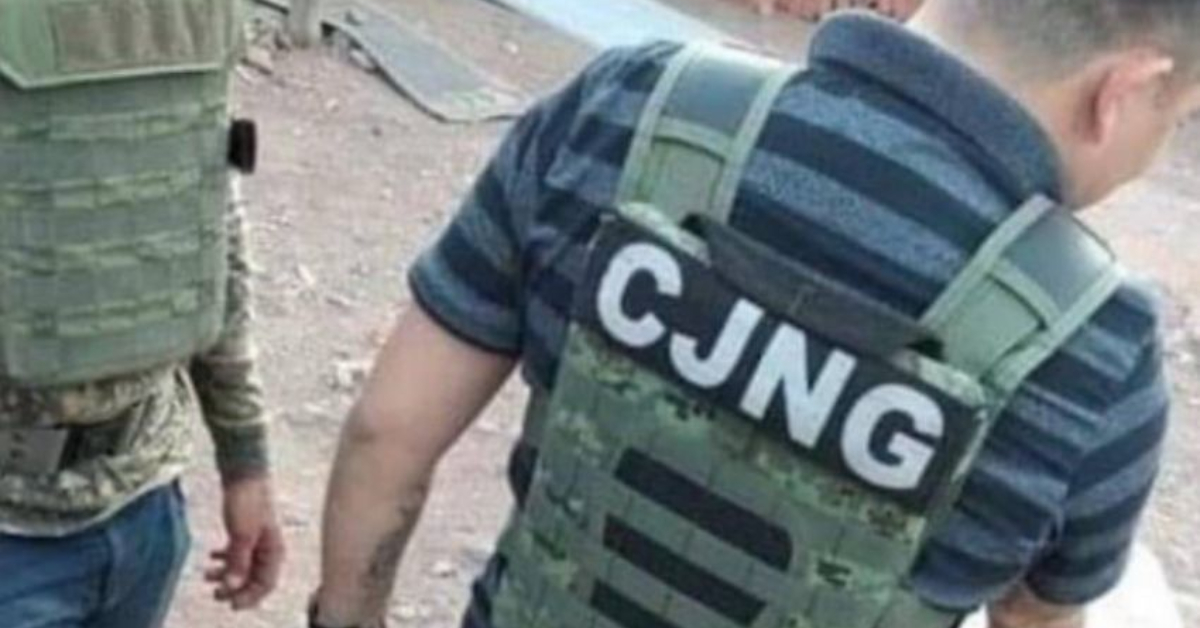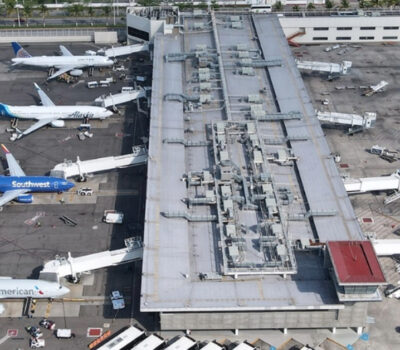Puerto Vallarta, Mexico – In a chilling reminder of the ongoing cartel violence in Mexico, a narcomanta (drug cartel banner) recently surfaced in Guadalajara, issuing a direct threat against the governor of Jalisco, Enrique Alfaro. The message, invoking a traditional Mexican saying, “He who serves two bosses, looks bad with one,” accused Alfaro of having ties with the Sinaloa Cartel, a claim that has intensified the already volatile situation in the state.
The banner, discovered in May 2021, ominously stated, “Not complying has a cost,” and also mentioned Pablo Lemus, who, according to the Preliminary Electoral Results Program (PREP) of Jalisco, is set to be the next governor. This incident came only a few months after the shocking revelation from José Armando Briseño de los Santos, a top CJNG (Jalisco New Generation Cartel) hitman, who disclosed that the cartel had plans to assassinate Alfaro.
Briseño de los Santos, who was involved in the 2020 attack on Mexico City’s police chief Omar García Harfuch, alleged that the CJNG targeted Alfaro due to his refusal to cooperate with them, despite some of his associates allegedly collaborating with the cartel on fuel theft operations. This assertion, reported by journalist Carlos Loret de Mola, further complicates the narrative of political and criminal entanglements in Jalisco.
The situation took a darker turn with the release of hacked documents from the Secretariat of National Defense (Sedena) by Guacamaya Leaks. These documents detailed three meetings between CJNG members and senior police officers close to Governor Alfaro. The meetings allegedly occurred shortly after Alfaro assumed office in December 2018.
On December 6, 2018, Enrique Alfaro was inaugurated as governor after winning the election as the candidate for the Citizen Movement party. Just five days later, Juan Pablo Hernández González, the operational director of the Zapopan Public Security Police Station, reportedly met with CJNG contacts Armando Gómez Núñez and César Iván Briseño Aguirre at a Toks restaurant in Gran Plaza Zapopan to discuss operations favoring the CJNG.
Further allegations surfaced regarding a December 17, 2018, meeting between Briseño Aguirre and Daniel Velasco Ramírez, then Secretary of Security of Jalisco. The meeting purportedly involved an offer of one million pesos and a promise to reduce violence in exchange for cooperation with the CJNG. Although Velasco Ramírez denied the meeting, his subsequent resignation in October 2019 raised suspicions.
Another alleged meeting documented by the National Intelligence Center (CNI) on January 3, 2019, involved military personnel linked to Velasco Ramírez and “El Abuelo,” a CJNG representative. The agreement reportedly included a pledge from the Jalisco government to notify the CJNG of impending operations and provide them with state resources, in return for five million pesos and a penthouse in Puerto Vallarta for Velasco Ramírez, according to journalist Ricardo Ravelo.
More recently, during the U.S. trial of Raúl Flores Hernández, alias “El Tío,” convicted in early 2024 for cocaine trafficking with Joaquín “El Chapo” Guzmán, a witness implicated Governor Alfaro. The witness described a man with the surname Alfaro as receiving cocaine shipments, suggesting a connection between the governor and the Sinaloa Cartel.
In 2018, journalist Anabel Hernández reported that the U.S. Department of Justice was investigating Enrique Alfaro for alleged drug trafficking links and had summoned him to their embassy in Mexico, a meeting he allegedly did not attend.
Adding to the tense atmosphere, another narcomanta found in October 2023 in Lagos de Moreno, signed by the Sinaloa Cartel, accused Alfaro of favoring the CJNG. The message starkly read, “It is more than obvious that you want to clear the way for the CJNG bitches, let them fight alone. We have been here for more than 20 years and they have never been able to defeat us.”
These revelations underscore the deeply entrenched and complex relationships between political figures and criminal organizations in Jalisco, raising serious concerns about governance and security in the state.
Political Violence Plagues 2024 Election Cycle in Mexico
In a harrowing display of violence, political candidates in strategically critical states such as Chiapas, Guerrero, and Michoacán faced unprecedented attacks during Mexico’s 2024 election cycle. This alarming trend underscores the pervasive influence of organized crime groups and other power brokers who seek to manipulate voting outcomes to maintain control amid political changes.
As Claudia Sheinbaum was elected Mexico’s first female president, election observers documented 129 incidents of political violence targeting officials during local, state, and federal elections. Over 20,000 positions were contested since the campaign began in early September 2023, according to data from the Armed Conflict Location & Event Data Project (ACLED).
A Complex Criminal Landscape
Each region in Mexico harbors multiple organized crime groups with varying degrees of sophistication, whose criminal activities intersect with local economic and political dynamics, fostering violent competition. This election season witnessed 102 political assassinations, along with kidnappings, forced disappearances, attempted murders, and attacks on family members, campaign staff, and official infrastructure, including ballot boxes. This scale of violence marked a particularly concerning period, explained Tiziano Breda, ACLED’s Associate Analysis Coordinator for Latin America.
“The violence was due to two main reasons: the magnitude of the election, with it being the biggest in the country’s recent history, and it’s also the consequence of how Mexico’s criminal landscape has evolved into a growing number of fractured groups with diverse economic portfolios competing for influence, and therefore exacerbating violence,” Breda told InSight Crime.
Historical Patterns of Election Violence
Past elections in Mexico have also been marred by extreme violence. The 2018 presidential election recorded 145 politically motivated murders, while the 2021 gubernatorial elections saw 88, according to data from the Mexican think tank Laboratorio Electoral.
Five states — Chiapas, Guerrero, Michoacán, Oaxaca, and Veracruz — accounted for half of all election-related violence documented by ACLED this year, predominantly targeting those seeking local political office. Each of these states is home to multiple organized crime groups whose interests overlap with local political and economic dynamics, intensifying violence that is not always directly linked to organized crime.
State-by-State Analysis
Chiapas: Located on the Mexico-Guatemala border, Chiapas has seen increased criminal activity from the Sinaloa Cartel and the Jalisco Cartel New Generation (CJNG), both vying for control over drug and migrant smuggling routes. Local communities often find themselves caught in the crossfire, such as in May when 11 civilians from a single family were massacred for refusing to collaborate with the cartels.
Guerrero: This state is a battleground for numerous armed groups, including CJNG, Guerreros Unidos, and others. These groups often use violence to co-opt local elections, securing influence and protection for their criminal activities, which range from drug trafficking to local extortion and control of state resources.
Michoacán: Known for its strategic corridor for synthetic drug production, Michoacán has seen the CJNG expand its influence, complicating existing alliances between crime groups and political powerbrokers. This year, several mayoral candidates were murdered, and many others withdrew their candidacies due to threats, highlighting the pervasive control exerted by criminal organizations.
The Path Forward
The violence continued even after the polls closed on June 2. In one incident, Yolanda Sánchez Figueroa, the municipal president of Cotija, was killed just one day after the election. This persistent violence indicates that the transition of political power later this year, including the inauguration of President Claudia Sheinbaum, may not bring immediate peace.
The entrenched influence of organized crime in Mexico’s political landscape presents a formidable challenge. As the country moves forward, addressing the root causes of this violence and establishing stronger safeguards for political processes will be crucial in fostering a more stable and secure environment for future elections.
Puerto Vallarta, Mexico - In a chilling reminder of the ongoing cartel violence in Mexico, a narcomanta (drug cartel banner) recently surfaced in Guadalajara, issuing a direct threat against the governor of Jalisco, Enrique Alfaro. The message, invoking a traditional Mexican saying, "He who serves two bosses, looks bad with one," accused Alfaro of having ties with the Sinaloa Cartel, a claim that has intensified the already volatile situation in the state.












